Sri Lanka’s Finance Ministry clarifies Imputed Rental Income Tax

Sri Lanka’s Ministry of Finance, Economic Stabilization and National Policies issued a press release on June 16, 2024, to address speculations regarding a proposed property tax mentioned in the International Monetary Fund (IMF) Extended Fund Facility (EFF) program documents.
This proposed tax is intended to be an imputed rental income tax.
The Ministry emphasized that one of the primary causes of Sri Lanka’s severe economic crisis was a sharp decline in government tax revenue, leading to high budget deficits and unsustainable public debt.
In response, the government has implemented revenue-based fiscal consolidation over the past two years, aiming to increase government revenue from 8.3% of GDP in 2022 to 15% by the end of 2025.
Significant progress has been made, with 2023 tax reforms focusing on corporate and personal income taxes, and 2024 reforms concentrating on Value Added Tax (VAT) adjustments.
The Ministry stated that the revenue targets for 2023 were largely met, and the 2024 target of 13.5% of GDP is on track. To achieve the 2025 target, a wealth tax focusing on property is planned.
This tax is designed to target high-wealth individuals rather than average income earners, with a suitable tax-free threshold to ensure only high-value properties or multiple properties owned by wealthy individuals are taxed.
The property tax is expected to contribute 0.2% of GDP in 2025 and 0.4% in a full year by 2026.
The specifics of the tax, including rates and thresholds, are still being finalized. The Ministry assured that the tax would include mechanisms to prevent double taxation and economic distortions.
Property taxes are common in many countries and are considered efficient and progressive means of generating revenue for public services.
The proposed tax is expected to be legislated and implemented by April 2025. Significant administrative efforts are needed to improve valuation mechanisms and databases for effective implementation.
The Ministry noted that this is not a new tax measure; a similar imputed income calculation termed “Net Annual Value” was included in the Inland Revenue Act No. 10 of 2006.
Property in Sri Lanka is already subject to existing taxes such as local authority Rates and Stamp Duty.
The Ministry concluded by stating that improving government revenue and reducing budget deficits are crucial for economic stability.
These measures have already helped reduce interest rates and support currency appreciation, benefiting all citizens.
Failing to reach the required tax revenue levels could lead to a recurrence of the economic crisis that previously impacted the entire country.

Latest Headlines in Sri Lanka
- China strikes back: Tariffs soar to 84% in escalating trade war April 9, 2025
- Sri Lanka launches bold anti-corruption drive April 9, 2025
- Court orders to exhume remains of Sathsara Nimesh April 9, 2025
- CID arrests Asoka Wickremasinghe over illegal construction approval April 9, 2025
- Keheliya leaves CID after giving statement on substandard drug import case April 9, 2025


